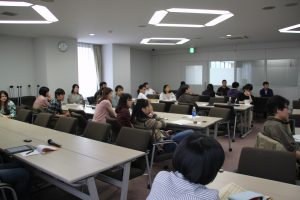Attribution of Liability for Misappropriation of Tangible and IntangibleThings in Japan: To Change the Law or to Change the Minds
*本ワークショップは、知的財産法研究会の共催で行われました。
日時:2012年10月3日 (水)
場所: 北海道大学 人文社会科学総合教育研究棟 W409室
参加者:田村善之、亀田達也、結城雅樹、高橋伸幸、高橋泰城、桂承均ほか32名(計38名)
タイトル: Attribution of Liability for Misappropriation of Tangible and Intangible
Things in Japan: To Change the Law or to Change the Minds
スピーカー:Dr. Branislav Hazucha (Associate Professor, Hokkaido University)


内容:
This presentation explores factors, which can affect individuals’ decisions on judging misappropriations of tangible and intangible objects as wrongful. It analyzes the data collected in a mail survey conducted in Sapporo, the fifth largest town in Japan. A random sample of 264 residents (from 20 to 60 years old) living in Sapporo were asked to respond to four short vignettes describing individual acts of misappropriations, such as (a) stealing a bicycle; (b) copying a DVD; (c) plagiarizing a song; and (d) manufacturing shoes with a design similar to the design of branded luxurious products. The experimentally varied vignettes included considerations of the wrongdoing’s circumstances (e.g., the actor’s mental state and the fame of copyrighted work or protected design) and consequences (e.g., the harm caused to a right-holder or consumers, the benefit gained by a wrongdoer, and the causal link between the act of wrongdoing and gained benefit).
The results obtained by the ordered logistic regression analysis of collected data show that the individuals clearly judge many uses of intangible things as wrongdoings, although their judgment can sometimes considerably differ in many regards from the current intellectual property law in Japan. In comparison between responses to different vignettes with same variables, we also found two significant differences in treating same or similar uses of different objects and different uses of same or similar objects. First, misappropriation of tangible things is treated more severely than misappropriation of intangible objects. Second, copying of entire copyrighted works is judged more severely than commercial activities where copyright infringement can occur accidentally or as a result of independent creation.